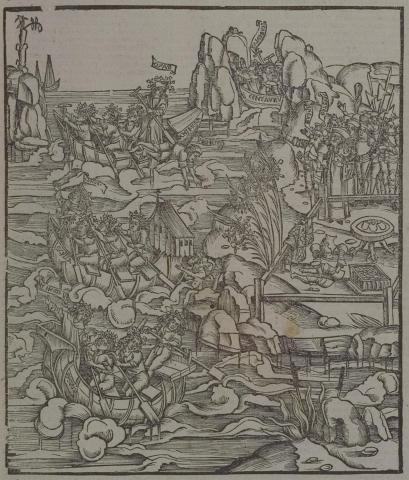CORE VOCABULARY
supersum, fuī, esse, irreg., n.: to be over; to be left, remain (separated by tmesis), 2.567; survive, 8.399.
Cloanthus, ī, m.: commander of one of the ships of Aeneas, 1.222.
adnītor, nīsus or nīxus sum, 3, dep. n.: to press upon; (with dat.), lean against, 12.92; lean, rest upon, 4.690; alone, make effort, strive, 5.226; ply the oars, 4.583.
urgeō, ursī, 2, a. and n.: to drive, impel, press forward, 1.111; ply, hasten, 9.489; press, oppress, crush, bear down, 3.579; press around, inclose, surround, hem in, 11.524; weigh upon, oppress, close, 10.745; overpower, 2.653; attack, 10.375; punish, torture, 6.561.
ingeminō, āvī, ātus, 1, a. and n.: a., repeat; redouble, multiply, increase, 7.578; name often, 2.770; n., shout again and again, 1.747; reëcho, 5.227; flash often or continuously, 3.199; be redoubled, return, 4.531.
īnstīgō, āvī, ātus, 1, a.: to goad on; incite, stimulate, encourage, 5.228.
resonō, āvī, 1, n. and a.: to sound again or loudly; reëcho, resound, 4.668; (w. acc.), make resound, fill, 7.12.
fragor, ōris, m.: breaking, the noise of breaking; a crash; noise; a burst or clap of thunder, 2.692; roaring, uproar, 1.154; shout, 5.228; noise of lamentation, 11.214. (frangō)
indīgnor, ātus sum, 1, dep. a. and n.: to deem unworthy; to fret, chafe, be impatient, 1.55; resent, 2.93; scorn, 8.728; be angry, indignant, 11.831; w. inf., 7.770.
pacīscor, pactus sum, 3, dep. n.: to make a bargain; to agree upon, stipulate, contract, 4.99; purchase, 12.49; hazard, stake, 5.230; plight, betroth, 10.722.
successus, ūs, m.: a going up, an advance; success, good fortune, 2.386; speed, 12.616. (succēdō)
possum, potuī, posse, irreg. n.: to be able; can, 1.242, et al.; to avail, have influence, power, 4.382. (potis and sum)
fors, fortis, f.: chance, hazard, luck, hap, fortune, 1.377; nom., fors, as adv. (for fors sit), haply, perchance, 2.139, et al.; abl., forte, by chance, perchance, haply, 1.375, et al. (rel. to ferō)
aequō, āvī, ātus, 1, a. and n.: to make equal in size, number, weight, etc., 1.193; 5.419; to equalize, divide equally, 1.508; make equal in length, 9.338; in height, raise to, 4.89; to equal, be equal to; to be as high as, on a level with; keep pace with, 6.263; return equally, requite, 6.474; lift, exalt, 11.125; p., aequātus, a, um, made equal or even; steady, 4.587. (aequus)
rōstrum, ī: a bill, beak, 6.597; the beak of a ship, 5.143; pl., Rōstra, ōrum, n., the platform or tribunal for magistrates and orators in the Roman forum, so called because adorned with the beaks of the captured ships of Antium; the Rostra. (rōdō, gnaw)
palma, ae, f.: the palm of the hand, 8.69; the hand, 1.93; palm branch, 5.111; a palm branch or wreath as the symbol of victory; reward, prize, 5.349; victory; a victor, 5.339.
pelagus, ī, n.: the sea; open sea, main, 1.138; flood, 1.246.
candeō, uī, 2, n.: to be of pure whiteness; p., candēns, entis, white, 4.61; at white heat; glowing, 3.573; 12.91.
taurus, ī, m.: a bull, steer, ox, bullock, 2.202, et al.
exta, ōrum, n. pl.: the inner parts of animals, esp. the upper portions, as distinguished from the lower intestines; entrails, 4.64.
salsus, a, um: adj. (cf. sal), made salty; salted, 2.133; salt-, briny, 2.173.
prōiciō, iēci, iectus, 3, a.: to throw or cast forth; to throw or cast down, as an offering; to throw or fling down, 5.402; throw away, 6.835; plunge, 5.859; expose, 11.361; w. dat., 12.256. (prō and iaciō)
liqueō, liquī, 2, n.: to be fluid; p., liquēns, entis, liquid, fluid, 5.238.
Nērēīs, idis or idos, f.: a Nereid, any one of the daughters of Nereus and Doris; a sea-nymph, 3.74. (Nēreus)
Phorcus, ī, m.: a sea-god, son of Neptune or Pontus and Gaia, 5.240; a Latin patriarch, 10.328.
chorus, ī, m.: a dance in a circle; a dance; a company of singers or dancers, choir, train, 1.499; band, troop, 5.581; festival, 11.737.
Panopēa, ae, f.: Panopea, a sea-nymph, daughter of Nereus, 5.240.
manus, ūs, f.: the hand, 1.487; freq.; (meton.), action, movement of the hand; work, art, handiwork, 3.486; prowess, heroic deed, action, 2.434; force, violence, 2.645; a collection of persons; a band, crew, troop; an army, 2.29; forces, 5.623; multitude, 6.660; pl., manūs, workmen, 11.329; dare manūs, to yield, 11.558; extrēma manus, the finishing hand or touch, 7.572.
Portūnus, ī, m.: Portunus, the Roman god of harbors or seaports; identified with the Greek Palaemon or Meliecrtes, 5.241. (portus)
impellō, pulī, pulsus, 3, a.: to push, thrust, drive to or upon; push onward, impel, 5.242; push, open, 7.621; smite, 1.82; ply, 4.594; put in motion, urge on, 8.3; shoot, 12.856; move, disturb, 3.449; (w. inf.), lead on, impel, induce, persuade, 2.55; force, compel, 1.11.
Notus, ī, m.: identical in meaning with auster; the south-wind, 1.85; wind, 6.355; storm, 1.575.
sagitta, ae, f.: an arrow, 1.187, et al.
portus, ūs, m.: a port, harbor, haven, 1.159, et al; (fig.), 7.598.

